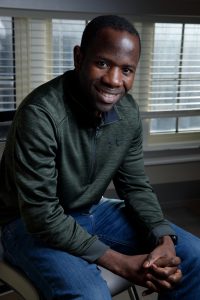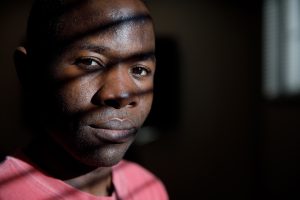Zambian PhD Student Reflects on Global Journey
By David Miller

Edson Chipalo’s pursuit of higher education began in his native Zambia, where he was orphaned as a child.
Going “viral” – for better or worse – is a feeling only few will share in their lifetimes. For Edson Chipalo, his recent social media attention is helping motivate others to overcome their circumstances.
Chipalo, a first-year doctoral student in the University of Alabama School of Social Work, didn’t think much of a 225-word status he penned on Linkedin just over a month ago. The post echoed sentiments he’d shared previously on social media: his origins as an orphan in Zambia, and his pursuit of higher education across the world.
Chipalo left Zambia in 2009 and has embarked on numerous volunteer and education missions that have included stops in South Africa, Scotland, New York, Massachusetts, Alaska and Alabama. His trek has inherent cultural challenges that he’s shared on social media – in his own words – and as the subject of a handful of news stories. In this Linkedin post, his story was a brief, personal reminder of the poverty he was born into and an update of his latest triumph: a fully-funded fellowship for doctoral study at UA.
“All of a sudden, the following morning, I woke up and [the post] had three million views, thousands of likes and 5,000 comments,” Chipalo said.
‘I’m not ashamed to tell it’
Chipalo says his pursuit of education is important, not just for personal motivation and his professional future, but as a tangible goal to help illustrate his life story for others.
The best way to reinforce the value of education is to share his personal experiences in that pursuit, which provide context for his message, he said.
“Being determined and focused has helped me get an education on scholarship,” Chipalo said. “I don’t have student debt.
“I had nothing where I came from in Zambia, but those experiences do not determine my future.”
When Chipalo left Zambia, he began doing volunteer work in South Africa and later Scotland. He then moved to the United States, where he would earn an associate’s degree at Berkshire Community College in Massachusetts, a bachelor’s degree at the College of St. Rhodes in Albany, New York, and a MSW at Columbia University. At each stop, he immersed himself in campus and town culture, from participating in community service work to serving in leadership roles in campus clubs. He also served on a state board in Massachusetts.
Creating his own sense of community has helped him acclimate quickly to new environments, including Tuscaloosa, where he’s joined the Tuscaloosa Running Club and competes in local charity races.
“All along, I’ve wanted to travel,” Chipalo said. “It was difficult to leave my friends and family in Zambia – you create all of these relationships wherever you go – but, to reach your goals, you need to make these changes and follow wherever the wind of opportunity carries you.”
Future plans
Chipalo said he wants to “go places people don’t want to go,” and of all his stops across the world, Alaska is the most extreme example of that motivation. Just a week after earning his master’s at Columbia in 2018, Chipalo accepted a job in Alaska, where he’d spend a year working as a children’s mental health clinician.
There, Chipalo worked with the indigenous population, studying their customs and cultures and issues unique to each tribe. Chipalo said he had a smooth transition into working with this population, many in extremely isolated communities, because, as a Black African, indigenous community members “didn’t find me to be different to them.”

At The Capstone: Chipalo will soon join Dr. Catherine Carlson’s research team as a data analyst.
These close relationships helped illuminate a number of needs, including improved mental healthcare and education to stem rates of suicide and alcohol abuse, which lead to PTSD among foster children and their parents, he said.
As a first-year PhD student, Chipalo conducted a systematic review of research on trauma experienced by refugee children. He also wants do research on foster children with PTSD and foster parents experiencing vicarious trauma, and said a lack of literature in that area powers his motivation to return to Alaska.
“I could perhaps do my dissertation there,” Chipalo said.
Chipalo is currently volunteering as a mental health clinician at UA’s Child Development Research Center, where he and researchers are testing an intervention titled “Implementing Interpersonal Psychotherapy (IPT)” via telemedicine for the treatment of adolescent depression in a rural school context. Chipalo is trained in that intervention and meets with clients – children from rural Alabama who have depression – once a week for 12 weeks.
Chipalo said he’s connected with UA social work researcher Dr. Catherine Carlson, who works with him on the CDRC study and nominated him for a 2020-21 UA Graduate Council Fellowship (for current students), which he has since received. He’ll join one of Carlson’s Africa-based studies and handle data analysis.
“My first semester [at UA] was very challenging,” Chipalo said. “You have to learn the language of a PhD, but each time I reach out to faculty and staff, they’re very open to help and provide the support I need. This is the right place for me.”